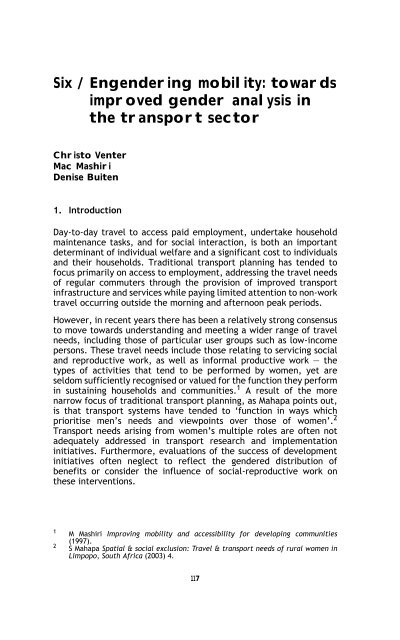Sex, Gender, Becoming - PULP
Sex, Gender, Becoming - PULP
Sex, Gender, Becoming - PULP
You also want an ePaper? Increase the reach of your titles
YUMPU automatically turns print PDFs into web optimized ePapers that Google loves.
Six / Engendering mobility: towards<br />
improved gender analysis in<br />
the transport sector<br />
Christo Venter<br />
Mac Mashiri<br />
Denise Buiten<br />
1. Introduction<br />
Day-to-day travel to access paid employment, undertake household<br />
maintenance tasks, and for social interaction, is both an important<br />
determinant of individual welfare and a significant cost to individuals<br />
and their households. Traditional transport planning has tended to<br />
focus primarily on access to employment, addressing the travel needs<br />
of regular commuters through the provision of improved transport<br />
infrastructure and services while paying limited attention to non-work<br />
travel occurring outside the morning and afternoon peak periods.<br />
However, in recent years there has been a relatively strong consensus<br />
to move towards understanding and meeting a wider range of travel<br />
needs, including those of particular user groups such as low-income<br />
persons. These travel needs include those relating to servicing social<br />
and reproductive work, as well as informal productive work — the<br />
types of activities that tend to be performed by women, yet are<br />
seldom sufficiently recognised or valued for the function they perform<br />
in sustaining households and communities. 1 A result of the more<br />
narrow focus of traditional transport planning, as Mahapa points out,<br />
is that transport systems have tended to ‘function in ways which<br />
prioritise men’s needs and viewpoints over those of women’. 2<br />
Transport needs arising from women’s multiple roles are often not<br />
adequately addressed in transport research and implementation<br />
initiatives. Furthermore, evaluations of the success of development<br />
initiatives often neglect to reflect the gendered distribution of<br />
benefits or consider the influence of social-reproductive work on<br />
these interventions.<br />
1 M Mashiri Improving mobility and accessibility for developing communities<br />
(1997).<br />
2<br />
S Mahapa Spatial & social exclusion: Travel & transport needs of rural women in<br />
Limpopo, South Africa (2003) 4.<br />
117
















